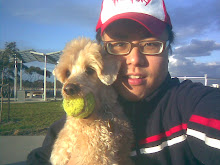The Great Happiness Space: Tale of an Osaka Love Thief
One of the more defining moments of Japan post-WW2 is the extreme sub-cultures that broke out from the traditional, conservative and strict code of conduct that the Japanese culture is famous for. In the last 30 years Japanese culture has exploded; while manga and anime is more famous in Western parts of the world, East Asian societies have become obsessed with the fashion, style and hedonism that has defined the Japanese youth sub-culture.
While not completely oblivious, I do not profess an interest in Asian cultures. Mostly, they dull my senses and reminded me of the totalitarian government in Singapore. While channel-surfing on Friday night, I chanced upon the titled documentary on SBS. It was only five minutes into the documentary, but it got me hooked.
Nihilistic lifestyle
This compelling film explores the rarely seen world of Japanese host boys, men who are paid to entertain financially independent women in exclusive nightclubs. Almost but not quite gigolos - they are more akin to male geishas - the host boys of Cafe Rakkyo share their secrets with director Jake Clennell. The narrative focuses on 22-year-old Issei, Osaka's top host boy and owner of Cafe Rakkyo, but all the characters in this unique subculture are fascinating.
I felt deeply moved by the emotional and physical torture that these young men go through to pull in several hundred dollars a day. It's good money, but it takes an emotional and physical toll. As the documentary progressed, it became apparent that many of them do not like their job, as they often have to struggle with the damaging effects of lies, deceit, alcohol and relationships.
Theses are young men who have young women shelling out in excess of 1 million yen (A$10,500) a night for emotional company; they're never lacking female suitors, style or money, yet they are intrinsically unhappy at everything around them. Yet something about the job makes them come back night after night. There's an unspeakable allure of power and control that these men crave for. What most men wouldn't do to trade their lives with them.
In just an hour, my emotions went from a high enviousness to a low sympathy. These are bright young men who are trapped in their job, not because they can't get out of it, but because they know nothing better than this. Perhaps the much used cliche 'the other side of the fence is always greener' doesn't do Issei and Co. much justice, as what they have is rather green.
Frankness of the interviews
Rarely do you see the protaganist (or in this case Issei, his lackeys and the women around him) being so comfortable and upfront to the camera. There is absolutely no need for narration, as they provided all of it. There is something refreshing about the way Issei talks about his business and himself. In just an hour, I felt I knew him well enough to be a judge of his character. And because everything is unscripted, the conversations caught on camera are extremely powerful.
The host boys who work for Issei look and talk the part as well. I have no doubt that Issei have pre-empted them of Jake's prying camera, yet they didn't look like they were hamming it up for the camera. As mentioned above, everything was unscripted. The emotions, actions and physical pain that these boys go through is real. I felt like I knew them enough to want to reach out. They need help.
Style
There's something about the camera work that is unobtrusive, stylish and bloody effective. You can barely make out the interviewer's voice above the din of the loud music, karaoke, and sounds that reverberate throughout the claustrophobic and dimly lit rooms. Issei and the boys - when pulled to one side for a one on one chat - are honest about their opinions and do not waffle. The girls - mostly interviewed outside the confines of Cafe Rakkyo - are candid and upfront about their feelings and thoughts about their lifestyles and affections for the boys.
I'm also rather intrigued with the relationship between Jake/Translator and the rest of the cast. It's quite evident that Issei and Co. have never met the camera crew, yet the way they spoke to the camera, I felt like I was sitting intimately next to them, sharing a dark secret with them. If it makes any sense, they were speaking into the camera. That is incredibly haunting.
Thoughts and ideas
Jake Clenell's style of documentary is reminiscent of Nick Bloomfield's style of documentary from the digidoss. In both cases the interviewees speak directly into the camera, as if the camera was part of their everyday thing. The camera is unobtrusive, yet it captures a nugget of life that most people are completely oblivious about. Watching Nick's documentary has also given me confidence and faith for my own documentary Tell Me A Story as it involves a heap of camera work and equipment. Before watching them, I was skeptical of showing either Bree, Alex or myself on camera as part of the cut. I was also hesitant on our voice being heard as well. If Nick Bloomfield convinced me that this style of documentary-telling is right, Jake Clenell's take on a Japanese sub-culture has taken my hand and have me pointing at the right direction.
EDIT: I've found a link to the documentary from Google video. Oddly enough, this version has converted the yen to dollars. Perhaps an attempt to make it more palatable for Western viewers. Check it out.

No comments:
Post a Comment